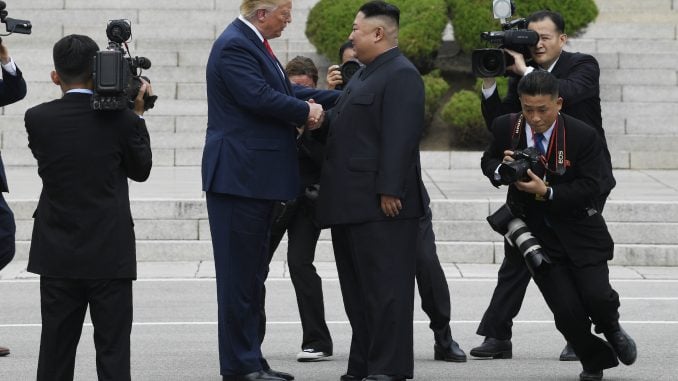
SEOUL, South Korea — South Korea’s president on Tuesday called a recent U.S.-North Korean summit at the Korean border an end of mutual hostility between the countries, despite skepticism by many experts that it was a just made-for-TV moment that lacked any substance.
During their impromptu third summit at the Korean Demilitarized Zone on Sunday, Trump and Kim reaffirmed their friendships and agreed to resume nuclear talks. Trump briefly crossed the border into North Korea making him the first sitting U.S. president to set foot on the North’s soil. But neither side has indicated they are any closer to resolving sticking points that collapsed their previous summit.
On Tuesday, South Korean President Moon Jae-in told a Cabinet meeting that the summit in the DMZ meant the two countries declared “an end of hostile relations” and the “start of an era of peace.”
Moon, who briefly chatted with Trump and Kim on a DMZ village before the U.S. and North Korean leaders sat for a two-way meeting, described their summit as “historic.” He also called the summit “the fruits of amazing imagination,” saying it was arranged due to Trump’s “unprecedented” Twitter offer for a meeting and Kim’s “bold” decision to accept it.
Moon, a liberal who took office in 2017, has lobbied hard to set up diplomacy between Trump and Kim to help find a peaceful settlement of the North Korean nuclear crisis. He met Kim three times last year, and their first and second summits happened at the same DMZ village called Panmunjom.
At the start of Sunday’s meeting, Trump went across ankle-high concrete slabs that form the military demarcation line at Panmunjom after Kim told him he would become the first U.S. president to be in North Korea if he did so. After walking together several feet, they turned back to the South for a summit that lasted about 50 minutes.
Trump said he was “proud” to step over the borderline and thanked Kim for showing up for the meeting. Kim said he was initially “very surprised” at Trump’s tweet Saturday proposing a DMZ meeting and that their summit could not have occurred if the two leaders didn’t have “great friendship.”
North Korea’s state media described Kim’s meeting with Trump as “an amazing event” and that both leaders expressed great satisfaction over the result of their talks. Moon’s government has also said it hopes the diplomatic momentum created by the latest Trump-Kim meeting would help revive inter-Korean dialogue.
U.S. and North Korean officials are expected to sit down for working-level talks in coming weeks to hammer out the terms of a mutually acceptable deal, but many experts say it remains unclear whether the negotiations would successfully address the fundamental differences between Washington and Pyongyang that were exposed in the second Kim-Trump summit in Vietnam in February.
The Hanoi summit ended without any agreement after Trump turned down Kim’s request for major sanctions relief in return for dismantling his main nuclear materials-making complex while leaving his already-manufactured nuclear bombs and long-range missiles intact.
The United States and North Korea have no diplomatic ties and are still technically at war because an armistice that ended their 1950-53 Korean War has yet to be replaced with a peace treaty. About 28,500 U.S. troops are stationed in South Korea as deterrence against potential aggression from North Korea.



